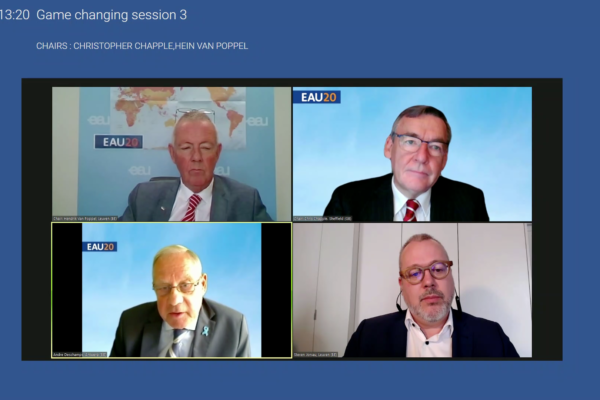EAU told that loss of sexual function is a real problem for half of men after treatment
Europa Uomo has presented the findings of its groundbreaking prostate cancer quality of life study at one of Europe’s most prestigious medical meetings. André Deschamps, Europa Uomo Chairman, told the European Association of Urology Congress that significant numbers of men are struggling with continence and sexual problems after prostate cancer treatment.
Analysis of the Europa Uomo survey results indicate that any treatment apart from active surveillance may negatively affect quality of life, and that for many men these effects may be greater than previously thought, he reported.
André Deschamps was presenting findings from the first international prostate cancer quality of life study conducted by patients themselves at the virtual EAU Congress, being held between 17th and 26th July. Download the presentation.
“The analysis of survey responses showed that urinary incontinence and sexual function were the two areas where men reported the lowest quality of life scores – much lower compared to the averages reported in clinical studies,” he said.
The Europa Uomo Patient Reported Outcomes Study (EUPROMS) gathered data from 2,943 European men from 25 countries. The respondents had an average age of 70 (all were over 45), and on average had been diagnosed with prostate cancer at the age of 64, meaning that they were reporting on quality of life six years after treatment.
Overall, 50% of men who replied to the questionnaire and had been treated for prostate cancer said that loss of sexual function (including the ability to have an erection or reach orgasm) was a big (28%) or moderate (22%) problem for them.
“We sometimes hear that prostate cancer is typically a disease of ‘old men’, implying that the loss of sexual function is less relevant. This survey paints a different picture.”
Radical prostatectomy has the largest reported impact on urinary incontinence. Radiotherapy was shown to double the fatigue a patient experiences in comparison to surgery. The impact of radiotherapy on sexual function is worse than radical prostatectomy but both have a severe impact.
Results indicate that the best quality of life scores are seen where the cancer is discovered in an early, curable stage. “This means efforts toward early detection and awareness are essential to avoid unnecessary deterioration in quality of life. Wherever it is possible and safe, active surveillance should be considered the first line treatment to ensure best quality of life.” said André Deschamps.
“Our findings provide patients and health care professionals with a snapshot of the impact of treatments. We hope they will be used to set realistic expectations of the effects of the different treatments for prostate cancer on quality of life. They show that the effects of prostate cancer often don’t stop after treatment, and even those who are treated successfully for their cancer may have significant problems”.
Chairing the EAU Congress session, EAU Adjunct Secretary General Hein van Poppel said: "For me the key point is that as health care professionals we have underestimated the impact on quality of life for patients treated for prostate cancer."
Analysis of the data was conducted by Professor Monique Roobol of the Erasmus University Medical Centre, Department of Urology, Rotterdam, who said:
“This study is important because it was initiated by patients and meant for patients. The questionnaires were completed unrelated to a hospital visit, which means respondents had more freedom to answer and provides insight into the effect of treatment on quality of life over a longer period.”
Download the Powerpoint of Andre Deschamps’s presentation with audio.
